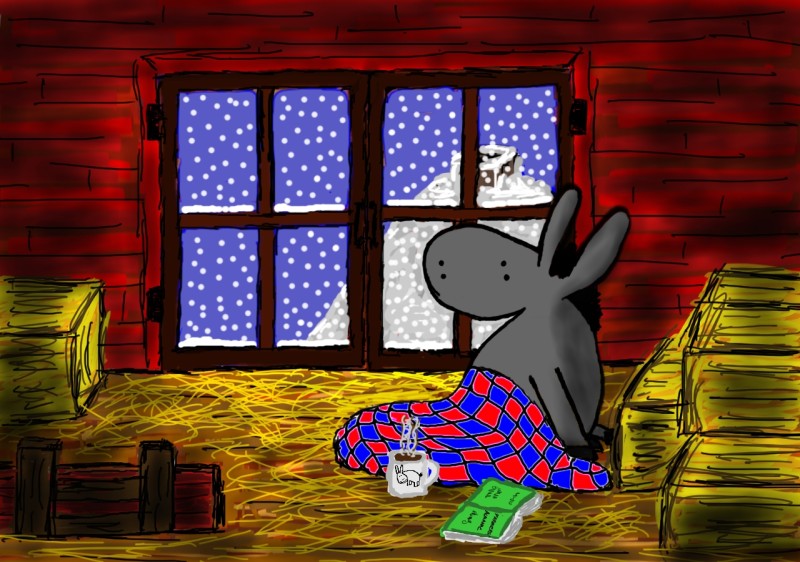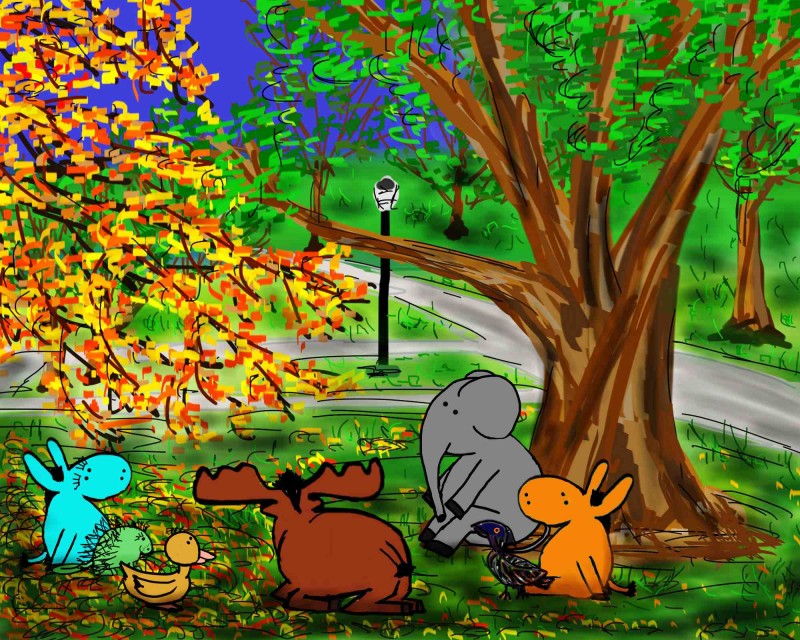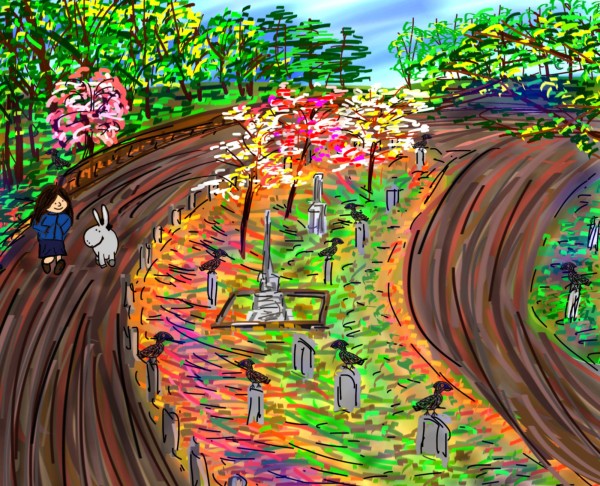I wonder how long it will snow? I wonder how much it is snowing in the mountains? I wonder if there is ice on the stream or if the snow is falling on the water? Snowflakes don’t last very long in the water. Unless there is a rock. Then the snowflakes can land on the rock. I wonder if snowflakes look for rocks in the stream? If I were a snowflake, I would look for a rock in the stream. It would be very sad if I were a snowflake on a rock, to watch all the other snowflakes land in the water. I think I would prefer to land in the water. Then I could be happy for all the snowflakes that landed on rocks.
Tag: death
“Weohryant University” (XIX) – Where 101
Today’s question, said Harlan, is: “Where did it go?”
Where did what go? said Chelsea.
It was here just a minute ago, said Morton.
I didn’t take it, said Emma Lou.
Neither did I, said Frank.
Do you mean “ubi sunt”? said Glouster.
Ubi sunt? said Morton.
“Ubi sunt,” said Glouster, is Latin for “Where are they?” It comes from a Latin poem that begins, “Ubi sunt qui ante nos in mundo fuere?” which translates: “Where are they who, before us, existed in the world?” It was a common theme in medieval poetry, and was most famously expressed by the French poet, François Villon who asked, “Où sont les neiges d’antan?” or “Where are the snows of yesteryear?”
The snows of yesteryear? said Morton.
I don’t like snow, said Chelsea.
Neither do I, said Frank.
I don’t mind it, said Emma Lou, so long as I’m not far from my den.
Why would anyone worry about last year’s snow? said Morton.
It’s a metaphor, said Glouster, for all the things you’ve lost in your life.
Lost? said Chelsea.
Yes, said Glouster, the things you had in the past that you no longer have.
The things I’ve eaten? said Morton.
Yes, said Glouster, and the friends you’ve lost, and your lost youth.
My lost youth? said Chelsea.
Yes, said Glouster.
I’m not going to lose my youth, said Chelsea.
Of course you are, said Glouster.
Really? said Chelsea.
Yes, said Glouster.
In that case, said Chelsea, I don’t like “ubi sunt.”
Crows live forever, said Frank.
They do? said Morton.
Sure, said Frank, crows, or “ravens”, and nightingales, and even some other birds.
Are you sure? said Morton.
Yes, said Frank, just ask Edgar Allen Poe and John Keats.
Who are they? said Chelsea.
They are poets, said Frank, who wrote about birds who live forever, birds who travel from heaven to earth to hell and then back again.
Have you been to heaven and hell? said Chelsea.
No, said Frank, not yet.
I don’t want to go to hell, said Morton.
Heaven and hell, said Glouster, are metaphors for, “the realm of the dead.”
I don’t want to go there either, said Morton.
Maybe, said Chelsea, that’s where the “ubi sunts” are.
I know a song, said Frank, about “ubi sunt.”
What’s it called? said Chelsea.
It’s called “The Ashgrove,” said Frank, and it has a blackbird in it.
How does it go? said Chelsea.
I don’t remember all the words, said Frank, but it’s about a woman who loses her lover and looks for him in an ashgrove.
Does she find him? said Chelsea.
No, said Frank, he’s buried beneath the green turf.
Is that a metaphor for “the realm of the dead”? said Morton.
Yes, said Frank.
Why doesn’t the blackbird, said Chelsea, fly to the realm of the dead, talk to the dead lover, then return and talk to the woman so she can have a sense of closure?
That’s a good question, said Frank.
What’s closure? said Morton.
Closure, said Chelsea, is talking with your ex-lover until you have nothing more to say.
Why would you want to do that? said Morton.
Because, said Chelsea, if you say everything you have to say, you can stop thinking about him when he’s gone.
So he doesn’t become an “ubi sunt”? said Morton.
Yes, said Chelsea.
I would like to be an “ubi sunt”, said Emma Lou.
So would I, said Glouster.
Why? said Chelsea.
Because, said Glouster, I don’t want to be forgotten.
Being forgotten, said Emma Lou, would be like a second death.
Maybe it’s a good thing, said Morton, for people to go around asking “ubi sunt?”
Why? said Chelsea.
Because, said Morton, it keeps the dead from dying.
“Morton’s Pond” (XXII)
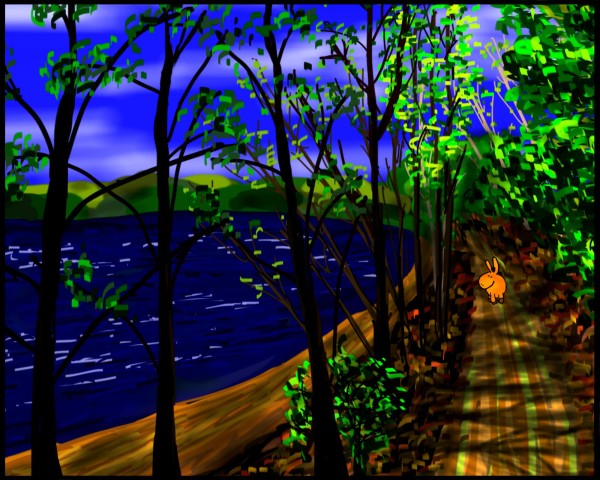
“Sounds” – I talked to Pablo about deer ticks and he told me their full name is “ixodes scapularis” and that they drink an animal’s blood four to five days before letting go. He said they can spread lyme disease, but that humans are more susceptible than donkeys. Maybe that’s why there aren’t as many humans in the woods. Maybe now that I know more about deer ticks, they will be less interested in biting me.
“Blurtso hears a whisper” (XI)
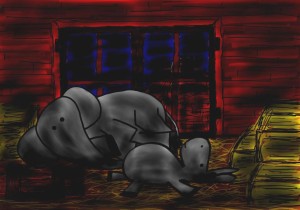
Harlan? said Blurtso. Yes? said Harlan. Do you ever get frightened? Frightened? said Harlan. Yes, said Blurtso. Sometimes, said Harlan. Why? said Blurtso. Well, said Harlan, when you consider how fragile things are–life, love, happiness–and how they’re certain to vanish, and the nothingness that follows, it’s natural to be frightened… but you can still be optimistic. You can? said Blurtso. Sure, said Harlan, we still have a tin of chocolate, and plenty of whipped cream.
